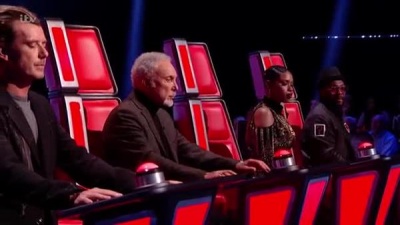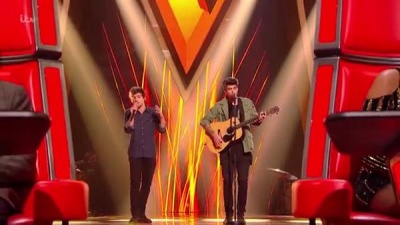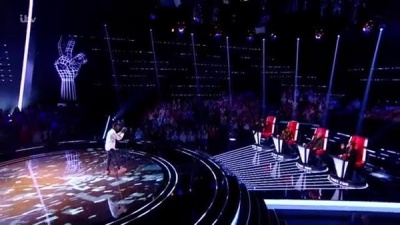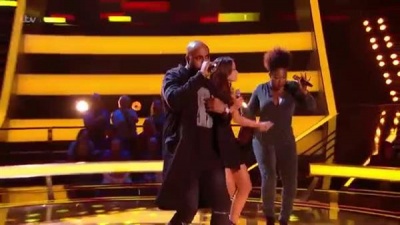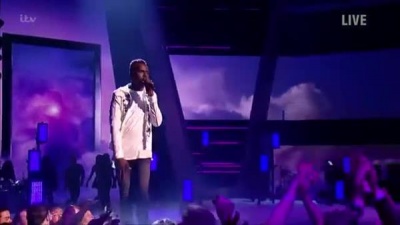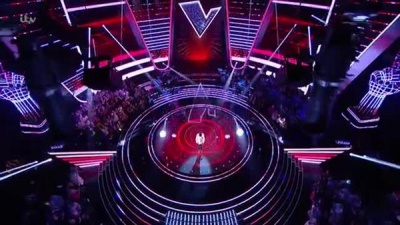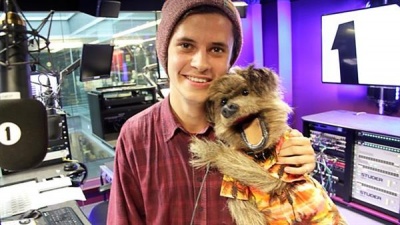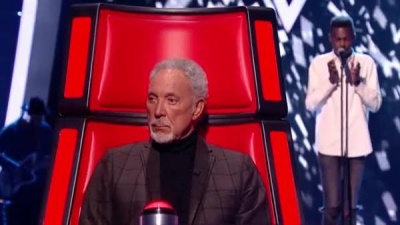Weaver's Week 2017-04-02
Last week | Weaver's Week Index | Next week
With the series coming to an end tonight, we take a look at television's most popular talent contest (for singers) (airing in the first quarter).
Contents |
BBC The Voice of This Territory
Talpa / Wall to Wall for ITV, 7 January – 2 April
We compare this year's format against our 2012 review.
When we last looked, the show was hosted by Holly Willoughby and Reggie Yates. They left yonks ago, replaced by Emma Willis and Marvin Humes. This year, Marvin has left, presumably to concentrate on his A-levels, so Emma Willis flies solo as presenter.
The judging panel has changed as often as the charts. Still in the number one seat, the Ed Sheeran around which The Voice is built, it's will.i.am. Jessie J, Kylie Minogue, Boy George have all been the oestrogen-friendly judge, this year it's Jennifer Hudson. Tom Jones was replaced by Paloma Faith for last year, but takes seat three.
Danny From The Script and Ricky Wilson From The Kaiser Chiefs filled the rocker's right-wing seat. This year, some bloke called Gavin. He had a lot of fans on social media, but it took us ages to work out that Gavin Rossdale was a judge and not trying to win the contest. He remains Gwen Stefani's ex-husband, and likely has less claim to fame than Kevin Simm did before he won last year.
Don't turn around.
BBC The Voice has one calling card: the Incredible Spinning Chairs. They're chairs! They spin! It's quite incredible! It's the only thing anyone watches for!
Over the course of seven weeks, about eighty of the finest applicants faced the judges. And by "faced the judges", we mean the exact reverse, "faced the back of their chairs". The performers – soloists and a few duos – sang. The judges face the audience, not the stage.
When the judge hears someone they want, they press a button. Lights flash, pistons activate, there's a strange shisshing noise from the chair, and the seat rotates 180 degrees counterclockwise. Only now will the judge see what they've let themself in for. After they've finished, the contender may be able to choose between judges, or progresses with the one judge who turned.
A few things have changed this year. We're able to hear the performance without interruption. Emma is backstage with the contestant's posse, and will celebrate / commiserate with them afterwards. There's no more barracking at the panel, and this helps to concentrate the focus on the contestant. A major positive.
Emma Willis tops and tails the show, but otherwise remains in the backstage room. The programme could run without a presenter – the format of video package, performance, family is so well established as to need no introduction.
When no judges turn, the contender just trudges away. There's no debrief, no honest critique, no "I would have turned if..." This is a significant loss for two reasons. For the contestant, it would have been suggestion for improvement, and we might conclude that the producers don't want to improve the standard of singing.
For the viewer, we lose an insight into the coach's strategy, what they're looking for in a team, the styles they can work with best. We can see that twee folk musicians and light opera are in no-one's battle plan. Loud soul singers are in Jennifer and Tom's sights, and can fit with will.i.am.
Not giving feedback also appears downright rude: the contender has performed, and doesn't get acknowledged. Good manners cost nothing. BBC The Voice now appears the sort of show that would let a door close in your face while you're carrying a heavy box.
The battle of who could care less
After seven weeks of auditions, we move into the most ludicrous and ill-considered idea it's ever been our misfortune to see, and we watched Face the Clock. It's the battle rounds. Each judge pairs off their singers, and has them both sing the same song, at the same time. The better singer, in the sole opinion of the judge, wins.
Astute judges will game the system. In 2012, we noted how Jessie J had picked some to take through and tilted the floor in their direction. This has almost become standard practice, judges know which singers they want to progress, and give them home songs and weak opposition.
The performances remain loud and overblown, preferring volume over technique. On the upside, the round isn't as much of a mess as in 2012, and at least they've done away with the literal boxing ring.
Here come the viewers!
Introduced in 2013, the It's A Knockout round reduces each team from six (five battle winners plus one steal) to three. Two chosen by the viewers, one from the judge. Contestants appear to have a free choice of song, though this will be constrained by the usual television licensing deals.
Unlike other talent shows – Strictly Come Dancing and The X Factor, mentioning no names – these knockout programmes are well paced. Six competition performances, a ten-minute active voting window, interval act, results and wrap up. It's all done and dusted in 75 minutes. In previous years, they've tried to do two knockouts in one night, and it just dragged on and on and on. This was the right size.
And then we're into the sectional finals, where each judge hears their three remaining singers. One is put through by the judge, the other two go into the public vote. Four semi-finalists are known before the public televote, and four more come from the phone and app voting.
The voting is much more simple, top four of eight go through. There's no need to strategically vote for act G on Jennifer's team in order to block act H in Jennifer's team because they're the clear threat to your favourite act R in Tom's team. Just vote for your favourite.
This live quarter-final flew by: two hours passed in the blink of an eye. As a whole, BBC The Voice has become much more slick, it's a far more oiled machine than we endured in 2012. With a clear structure – three performances, decision, repeat – we eased through the evening.
The best strategy for a judge might be: advance the best singer, if that's not clear, advance the same person from the knockouts because they're weak on the public vote. None of the judges employed this insight.
The success of Drake, or out for a duck?
For all this, we're still not convinced that BBC The Voice will launch a long career. While The X Factor has made a star most years, and Britain's Got Talent makes a star more often than not, BBC The Voice has introduced vocalist Becky Hill. And that's it, all they've got to show for five series.
We'd be surprised not to see at least one successful career emerge this year. Mo Adeniran has impressed with his soulful vocals, and duo Into the Ark have as much vitality as Sam and Mark. All twelve finalists had talents – but perhaps a little too polished for our tastes.
But even if you have the greatest line-up in the world, it's useless if no-one's watching. And no-one's watching: viewing figures were around 6.5m through the auditions, plunging to below 5m for the live shows.
One reason why the contestants don't make the impact is that they remain strangers. Tonight's winner will have performed solo on just five weekends – their audition, the knockout, and the three elimination shows. They'll have had a shouty duet in the "battle" round, and there may be a duet in the final weekend.
Winners of The X Factor turn up every single week for three months. They have many opportunities to show their talent, to explore their brilliance. By the time of the final, we're ready to marry the winner of The X Factor; for BBC The Voice, we've had a quick snog.
There's backstage coverage after the show, The V Room is on the website. Discussion of the night's play, questions for the panel, plenty of jokes, and recurring features. There are two substantial points in its favour: the after-party wraps in about 15 minutes, and it's hosted by the exceptionally talented Cel Spellman. We reckon it channels the spirit of Big Brother's Little Brother circa 2002 better than any other spin-off. It's the second-best spin-off ever from BBC The Voice, behind the three-minute show Hacker and Dodge Barkstage.
We've kept a close eye on the Tumblr tag for this show. The main topic of discussion has been the childcare arrangements for Gavin Rossdale and Gwen Stefani's kids, and how this might affect Gwen's time with new beau Blake Shelton. An interesting debate, but barely tangential to the programme. That's what the cool kids are discussing, and that tells us BBC The Voice is missing the young market.
And there's one other change. BBC The Voice is made by Talpa, which is now part of ITV Studios. By a remarkable coincidence, ITV Studios has preferred to sell its successful shows to ITV. BBC The Voice has hopped channels, and now carries adverts in the middle. Or it would do if we hadn't watched the series on catch-up, fast-forwarding through the interruptions.
Final score
Back in 2012, we reckoned BBC The Voice was a few tweaks away from being special. It still is. It's a quickie, it's a fast track to a talent show victory. The series doesn't outstay its welcome, but that means we can never get to appreciate the quality of the performers – or find their limits. We see their brilliance, but barely get to know the person: the connection is technical, not emotional.
Over the years, they've tinkered at the edges but not really altered the heart of the show. Whatever channel, BBC The Voice remains The Incredible Spinny Chairs Show, with a bolt-on competition afterwards.
This Week and Next
From across the pond, we hear that Cash Cab is back. There won't be a single host, but lots of guest hosts including comedians and stars of telly and cinema.
University Challenge heads towards the finish, and the last all-winning side are out. Wolfson Cambridge beat Emmanuel Cambridge by 175-140.
As is traditional, Eric Monkman's buzzer work carried the day, he got seven starters. After falling behind early on, Emmanuel were always close, but rarely had a chance to take the lead. Hill their best buzzer, with four starters. Neither side was particularly strong on the bonuses, they do make questions a bit harder for this final push, so it becomes a test of reflexes.
As we've been noting, xenophobes such as Boris Johnson and Theresa May don't want to see "foreign" students at top universities, they've no commitment to providing an all-round education. Without the overseas contingent, Wolfson lose tonight's tussle by 140-20... but Wolfson would have been eliminated by SOAS in the opening round, and it's SOAS who would take a place in the final.
But it's been Eric Monkman's week. The student from Oakville Ontario is back on this side of the pond, and has been doing a round of interviews. Eric and Bobby Seagull were on The One Show on Tuesday, and Eric was the subject of Radio 4's investigative Profile last night.
It seems that the chattering press (mostly The Manchester Guardian) claims a contestant each year as their fave, and extends their fifteen minutes of fame.
Why does this happen? Perhaps it's because Eric Monkman, Hannah Woods, Alex Guttenplan, and Gail Trimble are on screen a lot – finalists will perform on screen for hours, much more than anyone on BBC The Voice. In our snog-marry-avoid metric, we can marry the University Challenge finalists.
Korfballers and Cosmopolitans met in Only Connect second semi-final. It was a close contest.
Korfballers took the opening round 3-2, their score entirely from pictures of Gilbert and Sullivan operettas. The Cosmopolitans scored on "black and blue" pairs, and a delicious question of music recorded by Patsy Kensit's husbands.
5-5 after the Sequences. Both sides took two on their opening questions: Cosmos on the vowel-consonant decomposition of words, Korfballers on significant wedding anniversaries as chemical formulae. Cosmopolitans drew level with the Third Man on Apollo missions.
"Those walls were horrible" crossed both sides' lips: the Korfballers had slightly the better, winning the round 4-3. But the Cosmopolitans edged Missing Vowels by 7-5, thanks to their superior knowledge of Exodus chapter 20 (the Top Ten commandments). Korfballers might have had the answer to draw level, but time expired before they could start their answer. If it ain't started, it ain't heard. Cosmopolitans win the match 15-14, and face the Verbivores in next week's final.
BARB ratings in the week to 19 March.
- Broadchurch (ITV, Mon) is the top show, seen by 9.7m people. Saturday Night Takeaway (ITV) secured 8.2m.
- BBC The Voice (ITV, Sat, 4.8m) took the silver medal, The Big Painting Challenge (BBC1, Sun, 4.4m) bronze. Let's Dance for Comic Relief (BBC1, Sat, 3.7m) and 5 Gold Rings (ITV, Sun, 2.8m) made their channels' top 30.
- On BBC2, The Great Pottery Throw Down (Thu, 3.15m) beat Top Gear by a nose. University Challenge (Mon) fell to 2.6m, it's again hurt by football on BBC1. Only Connect (Fri, 1.75m) continues to struggle.
- Top digital shows: Hell's Kitchen (ITV2, Tue, 450,000), Come Dine with Me (More4, Sun, 415,000), Four in a Bed (More4, Sun, 365,000) and Portrait Artist of the Year (Artsworld, Tue, 360,000). That's a stupendous figure for a niche interest on an obscure channel.
Coming up: the finals of BBC The Voice (ITV, Sun) and Only Connect (2) (BBC2, Fri). Me and My Dog (BBC2, Wed) is a test of dog, human, and Chris Packham. And the University Challenge Boat Races (BBC1, Sun) feature combined Oxford and Cambridge teams. Hint.
Photo credits: Talpa, BBC.
To have Weaver's Week emailed to you on publication day, receive our exclusive TV roundup of the game shows in the week ahead, and chat to other ukgameshows.com readers, sign up to our Yahoo! Group.


